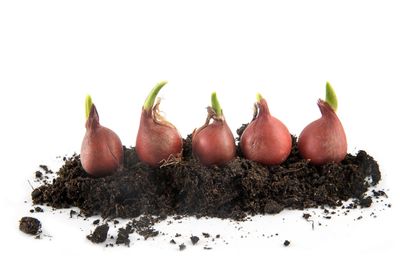What Soil Do Bulbs Like?
Bulbs like a neutral pH 7.0, which is ideal soil for bulbs. Neutral pH is important in establishing root health and growth. Lower than 7.0 is acidic and higher than this is alkaline, neither of which help the roots develop. The best kind of soil for planting bulbs is sandy loam – a balanced mix of clay, sand, silt, and organic matter. Keep in mind that “balance” is needed as soil requirements for bulbs. Clay and silt are two types of soil that are very dense and give little room for roots to develop. Clay and silt also retain water, which impedes proper drainage. Sand adds texture to the bulb garden soil and provides water drainage and aeration for a healthy plant. Ideal soil for bulbs includes good drainage, therefore, picking the right spot for planting bulbs needs to be in an area that drains well. Pooled or standing water will lead to root rot. General Rule of Thumb – plant spring bulbs two to three times as deep as the bulbs are tall. That means large bulbs, such as tulips and daffodils, should be planted about 8 inches (20 cm.) deep. Smaller bulbs should be planted 3 to 4 inches (8-10 cm.) deep. It is important to dig deep and loosen the soil for planting bulbs. Give the roots room to grow and develop. This rule, however, does not apply to summer bulbs, which have varying planting instructions. Refer to the instructions that come with the summer bulbs. Bulbs should be planted in bulb garden soil with the nose (tip) pointing upward and the root plate (flat end) downward. Some bulb experts prefer to plant bulbs in a spaded bed rather than with a single bulb planter. If the soil for planting bulbs is ready and prepped, to each their own.
Fertilizing Bulb Garden Soil
Spring and summer bulbs need phosphorus to stimulate root development. Interesting fact: phosphorus acts slowly once applied to the bulb garden soil, so it’s important to work the fertilizer (bone meal or superphosphate) into the lower part of the planting bed before placing the bulbs in the soil. Apply additional soluble fertilizer (10-10-10) after the bulbs are planted and once a month after shoots appear. DO NOT fertilize after the bulbs start flowering. DO NOT use amendments such as mint mulch, horse or chicken manure, mushroom compost, garden compost, or commercial soil amendments for bulb beds. The pH is either acidic or alkaline, which hampers healthy root growth and can actually kill the bulbs.
